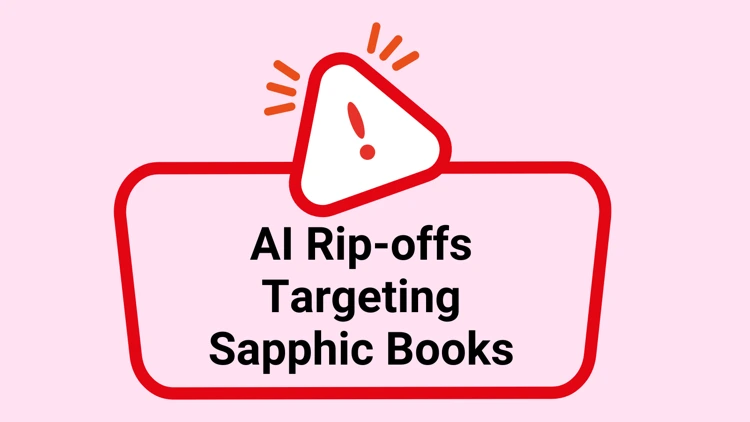
The sapphic book community has been facing a lot of challenges this year, from the growing fear of LGBTQ+ book bans and censorship to a noticeable drop in sales for many authors.
Now we are faced with a new threat, and I wanted to share it with readers because you are a vital part of the community, and authors are going to need your help and support to weather this latest round of nonsense.
TL;DR (Too Long; Didn’t Read): AI rip-offs are flooding the sapphic book market
If you don’t have time to read the entire blog post, here’s the short version, but I do encourage you to come back and read it all!
The sapphic fiction community is under attack by scammers using AI to churn out rip-off books based on real sapphic novels.
226 suspicious titles were identified, mostly published within the past month, likely all by the same person under 22 different pseudonyms.
This blog post shares a list of red flags to help identify possible AI rip-offs.
Things readers can do:
- Spread awareness about AI rip-offs by sharing this blog post.
- If you come across a suspected rip-off, alert the original author so they can check it out.
- Be very careful not to jump to conclusions and accuse potential real authors. Some similarities might be coincidental or due to both books being based on the same tropes.
- Use Amazon’s “report an issue” feature or leave 1-star reviews on suspected rip-offs only after getting confirmation from the original author.
The longer version of what happened
Last week, a reader alerted one of my fellow authors to a sapphic book that felt suspiciously similar to the author’s. Then another author found another one.
After spending years tracking down stolen translations within the sapphic fiction community, I have developed a good eye for finding illegitimate books, so I went down a rabbit hole and combed through all sapphic new releases of the last month.
What I found was shocking: This isn’t a case of a single person using another’s book as a template to write their own. What I found is a disturbing pattern of AI-generated books based on real authors’ works, and I fear it will only get worse if we don’t stop it now.
What I found so far
- 226 sapphic books that I very strongly believe have been ripped off from other authors using AI. That’s not even counting the translations based on these rip-offs!
- For 70 of those books, I could identify the originals and alerted the authors.
- Those 226 books were published by 22 different “authors” (I use that word very lightly because those people aren’t actually authors; they are scammers out to make a quick buck by profiting off other people’s work). There are strong indications that those 22 “authors” are all the same person, as they all follow the same pattern (see “red flags” below).
What’s the big deal?
You might be thinking: If this doesn’t meet the legal definition of plagiarism (see below for an explanation of why it likely doesn’t), then what’s the big deal?
Frankly, as an author who spends hundreds of hours creating complex characters, coming up with story ideas, and creating realistic plots, I don’t much care about the legal definition. To me and to all other authors I talked to, this is theft.
Authors who use generative AI to write books or create covers are already in ethically questionably territory because those AI tools were trained on the works of human authors, artists, and graphic designers without their consent or compensation. It was recently revealed that Meta used millions of book from an ebook piracy site to train its AI–including all of my books and those of pretty much every sapphic author I know.
These scammers are taking it even further by stealing from individual authors in addition. These people are not writers. They use AI to scrape our plots, our blurbs, and our characters to make money without putting in any of the work. They steal from real books written by queer women, nonbinary writers, and other marginalized creators, likely without having any idea of what it means to be part of the LGBTQ+ community.
If they published 226 rip-offs within just the last month, can you imagine what it will do to the sapphic book community long-term? They will flood the market with mass-produced AI rip-offs, making it harder for readers to find authentic books and threatening authors’ livelihoods.
These books also erode readers’ trust in authors. Readers might start to hesitate to take a chance on a new or new-to-them author, fearing that any author they aren’t familiar with might be one of the AI-spamming culprits.
For some authors, this might be the straw that breaks the camel’s back and makes them give up writing—because what’s the point if anyone can just steal their ideas, toss them into AI, and make money off it?
That’s why I’m speaking up and taking the time to write this blog post. I know it’s a long one, but it’s important, so please bear with me and read all the way to the end.
Red flags: How to spot AI rip-offs of sapphic books
Below, I’ve listed some warning signs to watch out for.
Important: None of these signs alone can confirm anything, so please read the caveats below carefully. But when a book displays several of these red flags, it becomes more and more likely that you’re dealing with an AI rip-off. Please make sure you read this blog post all the way to the end because the last thing we want is to accuse innocent authors.
Here’s the list of common red flags:
- They use generative AI for everything: They create new covers using AI, rewrite the original blurb using AI, and use AI to rewrite the book.
- Obvious similarities, but with changes: The books are not exact copies of the originals, but the similarities are obvious. They change the character names and often other details, e.g., a soccer player in the original becomes a cricket player in the rip-off. The plot isn’t 100% identical, but the parallels are still very obvious. For example, in the original (Sometimes We Fly by Cheyenne Blue), the newsreader main character is dragged out of a work dinner to the police station because her 16-year-old daughter has been arrested for carjacking. In the AI rip-off, the newsreader main character is dragged out of reading the news to the police station because her 16-year-old daughter has been arrested for vandalizing.
- Caveat: Not every book with a similar idea is a rip-off. Romance novels often use the same character types, e.g., ice queen CEOs, and the same tropes, which naturally leads to books having similar key scenes. For example, fake relationship romances usually have a scene in which the characters have to kiss to convince others they are a couple. Plenty of them also have an only-one-bed scene. That’s not necessarily plagiarism or a sign of a rip-off. Look for patterns of similarities that can’t be explained by mere coincidence or the authors using the same tropes. In the example above, what are the chances of two sapphic books being published in the same month with a main character who is a newsreader with a 16-year-old daughter who’s arrested so she’s dragged to the police station at the beginning of the book? Those are very specific parallels that can’t be explained by both books using the same trope.
- More similarities at the beginning of the book: What they seem to be doing is to feed the original blurb (book description) into AI and ask it to write the book. That means the first 25-50% of the book will have more similarities to the original since that’s the part of the book the blurbs covers. The second half of the book will often deviate considerably and might go into an entirely different direction. The plot might become confusing, with entire plotlines going nowhere or becoming tangled, or the book might have an ending that is strangely anticlimactic.
- Caveat: A confusing plot, dropped plotlines, or an unsatisfying ending aren’t sure signs that a book is an AI rip-off. It could be just bad writing. It’s easy to tell a well-written book apart from an AI-generated book, but harder to differentiate an AI-generated book from a book that just isn’t written well.
- The blurbs echo the original: The blurb has very obvious similarities to the original, often using some of the same phrases, but rephrasing other parts.
- Example:
- In the example below, I put the instances where the rip-off and the original used the exact same words or phrases in ALL CAPS:
- Original (The Princess Match by Clare Lydon):
- Princess Victoria has perfected the ROYAL PLAYBOOK: calculated SMILE, CONVENIENT boyfriend, impeccable press. But behind the tiara ticks a heart that’s tired of playing by the rules.
- Enter Ashleigh Woods: England’s football CAPTAIN, media darling, and living proof that AUTHENTICITY scores every time. When Victoria PINS AN MBE ON Ash’s lapel, the INSTANT chemistry jolts both their worlds.
- STOLEN GLANCES become SECRET meetings. Private texts become tabloid gold. And suddenly, Victoria’s tearing up her royal rulebook for a woman who makes her feel like more than her title. Ash has faced down penalty shootouts in European Cup finals, but winning Victoria’s heart? That’s the MATCH OF HER LIFE.
- When their romance hits the headlines, it’s game on: bow to tradition, or fight for a love that could change history. Victoria’s got a crown to inherit. Ash has a legacy to defend. Neither planned to start a revolution, but when destiny meets desire, sometimes you have to risk it all to win.
- Rip-off:
- Princess Evelyn lives by the ROYAL PLAYBOOK: duty first, SMILE always, maintain the perfect image. Trapped by tradition and stifled by a CONVENIENT, passionless relationship with Lord Arthur, she secretly yearns for something real, something more.
- Freya Brown: England’s charismatic cricket CAPTAIN, a powerhouse on the pitch and refreshingly AUTHENTIC off it. When Evelyn PINS AN MBE ON Freya’s blazer, the connection is instant, electric, and utterly forbidden.
- STOLEN GLANCES ignite SECRET texts. Witty banter deepens into late-night confessions. Clandestine meetings in borrowed flats and hidden corners explode into passionate encounters that leave them both breathless and wanting more. Evelyn finds herself shedding her royal skin, discovering a fierce desire she never knew she possessed, while Freya navigates the thrilling, terrifying reality of falling for a woman destined for a throne.
- Their sweet, funny, and intensely sexy affair is a refuge – until the paparazzi lens shatters their secret world. Splashed across the headlines, their love becomes a national scandal. Evelyn faces an impossible choice: uphold centuries of tradition and marry the ‘suitable’ man, or fight for the cricket captain who holds her heart. Freya, accustomed to pressure on the field, now faces the MATCH OF HER LIFE – battling prejudice, protocol, and the palace itself for a future with the woman she loves.
- Duty demands sacrifice. Her heart demands Freya. In a world bound by rules, can Princess Evelyn make her play and choose a love that could rewrite history, or will the weight of the Crown crush their forbidden romance forever?
- AI-generated covers, often with issues: As I mentioned, the covers are almost all AI-generated. Many of the covers don’t have the correct author names but either no author name at all, the wrong name, or some AI-created gobbledygook. Some covers do have the correct author name, though.
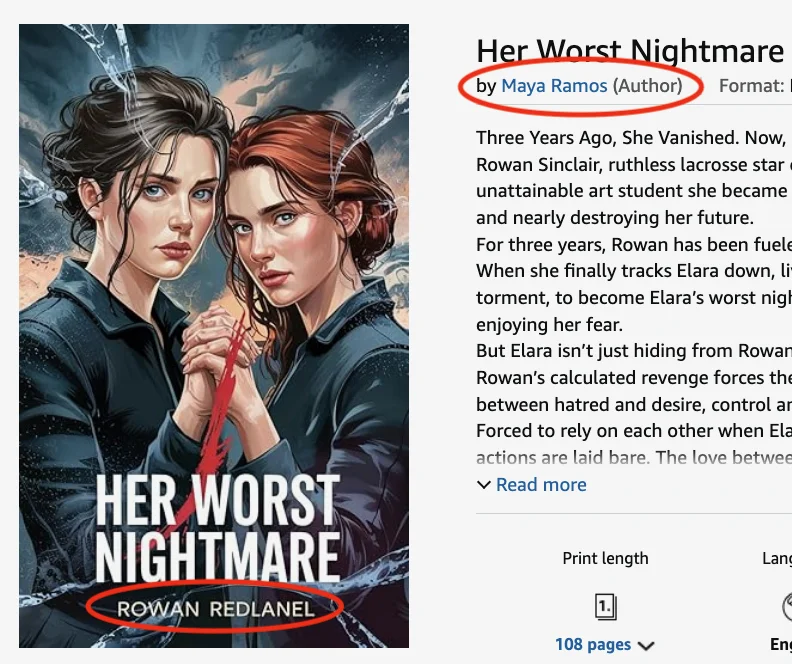
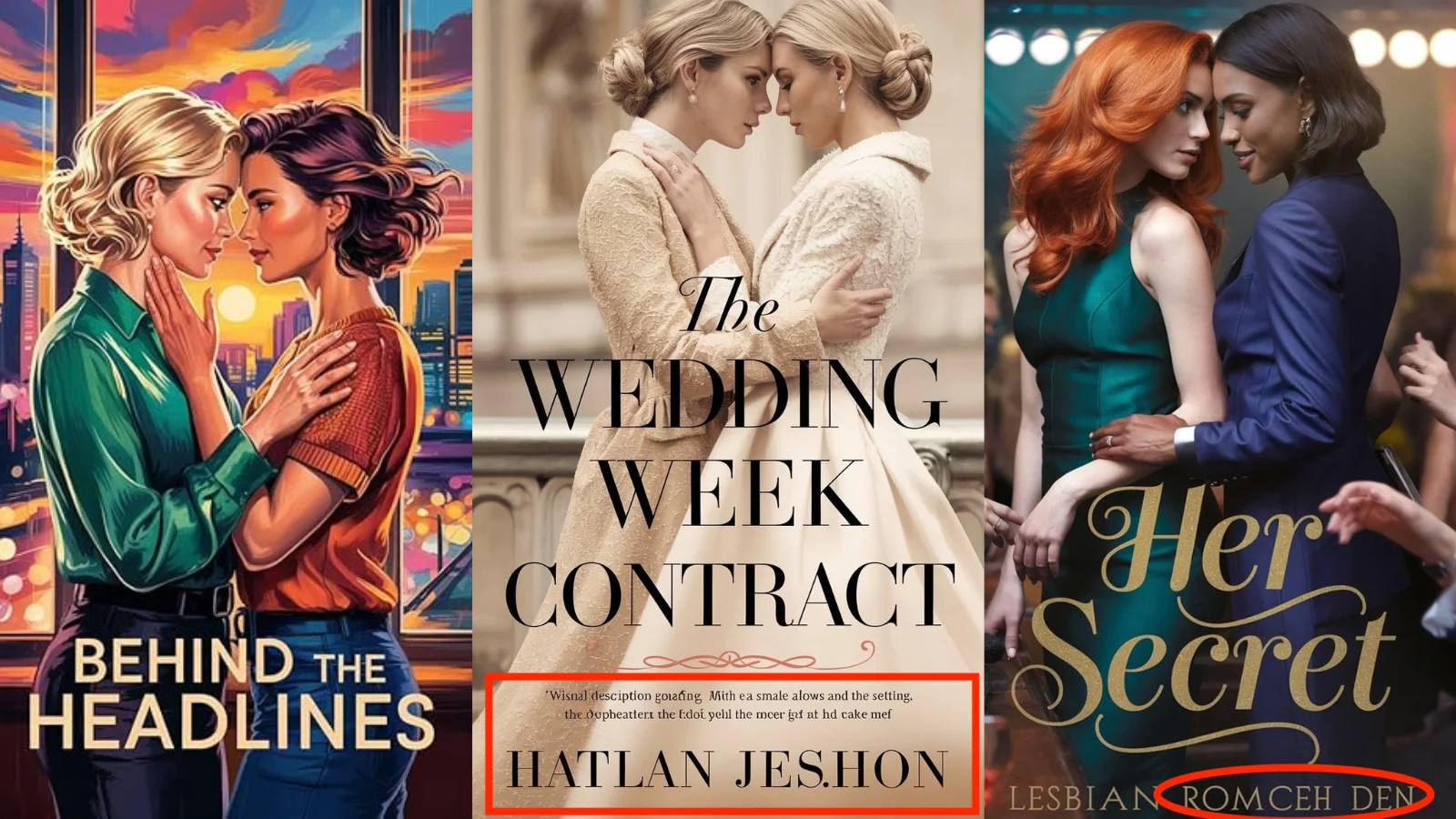
- Caveat: As I stated above, using generative AI to create covers is ethically questionable because AI was trained on the works of artists and cover designers without their permission or compensation. An author using AI for their cover doesn’t necessarily mean they stole the blurb of a specific book to create a rip-off, though. However, an AI cover without any author name or the wrong name is a clear red flag that indicates a rip-off. Not a single legitimate author I know would publish a book with a cover that doesn’t have their name on it. It’s not only unprofessional, it’s also against Amazon’s terms of service, so authors know to avoid that.
- Ebooks only: The books are only available as ebooks, not as paperbacks. Some are in KU; some aren’t.
- Caveat: While most authors make their books available as paperbacks, there might be some legitimate authors who publish digital only, so that alone is not a red flag.
- Impossible publishing speed: They publish their books faster than any human author not using AI could, often publishing multiple books within the same week.
- Typeset using Reedsy: This is a red flag that took me a while to notice, but once I found it, it confirmed that I had correctly identified all scammer pseudonyms because they all use the same free service to format their ebooks. If you click on “read sample” on Amazon and scroll up to the copyright page (which you’ll find above the table of contents), you’ll see the words: “This book was professionally typeset on Reedsy. Find out more at reedsy.com”. That means the scammer used the free ebook formatting app on Reedsy to create the ebook. On the same copyright page, about 10% of the rip-offs I found list “Henry Morgan” as the copyright holder. If you see (c) Henry Morgan, yet he is not listed as the author of the book, that’s a surefire way to identify it as a rip-off!

- Caveat: Reedsy is a legitimate service. Plenty of authentic authors use them, so if you find “typeset on Reedsy” in an ebook, it doesn’t necessarily mean it’s a rip-off. It’s just one of several red flags that, taken together, form a pattern.
- No author presence: These scammers have no social media presence. Their author profile on Amazon is usually blank, without a photo or author’s bio.
- Caveat: Not every author who prefers not to use a photo or doesn’t have an author’s bio on Amazon is creating AI rip-offs. They might simply prefer to stay anonymous.
- Publishing across different target audiences: They often (but not always) also publish M/M and M/F romances, not just sapphic books.
- Caveat: There are hard-working authors who publish in multiple categories, across sexual identities. That alone isn’t a red flag.
- Instant AI translations: Many also have translations into multiple languages, mostly French and German. Those translations are AI-generated too, so the quality is bad, at times with pronouns being confused (using “he” instead of “she” in a few places because the AI apparently expects that a love story between two people will be between a man and a woman…).
- Caveat: It goes without saying that not every author whose books were translated into multiple languages is using AI or creating AI rip-offs. Most of my own books are available in German because I translate them myself, and several of my books have also been translated into French by a French publisher. However, the AI translations are often published within a few days of each other, and very few authors paying translators and editors could afford that.
- Superficial diversity: I hate to say it, but the covers are often more diverse than the average sapphic book, often depicting an interracial couple. Not all of the rip-offs have a person of color on the cover, but it’s more common than you would see it in the top 100, for example. The diversity is only superficial, though, as the book isn’t written authentically from a person of color’s perspective.
- Caveat: It should go without saying that, of course, not every book that has an interracial couple on the cover is an AI rip-off.
- Targeting (mostly) bestsellers: Most often but not always, they steal books that are currently in the lesbian romance/lesbian fiction top 100 on Amazon.
- Repeating names: They often (but not always) repeat the same character names across books: Seraphina, Rossi, Maya, Sterling, Rowan, Thorne, Vance, Chen, Moreau. Certain place names are common too, e.g., Willow Creek.
- Caveat: Just because an author uses any of those names doesn’t mean their book is an AI rip-off. For example, Chris Zett’s characters in Flipping Hearts and Homes are named Rowan and Maia, yet I know for a fact that she spent months coming up with just the right names for her characters.
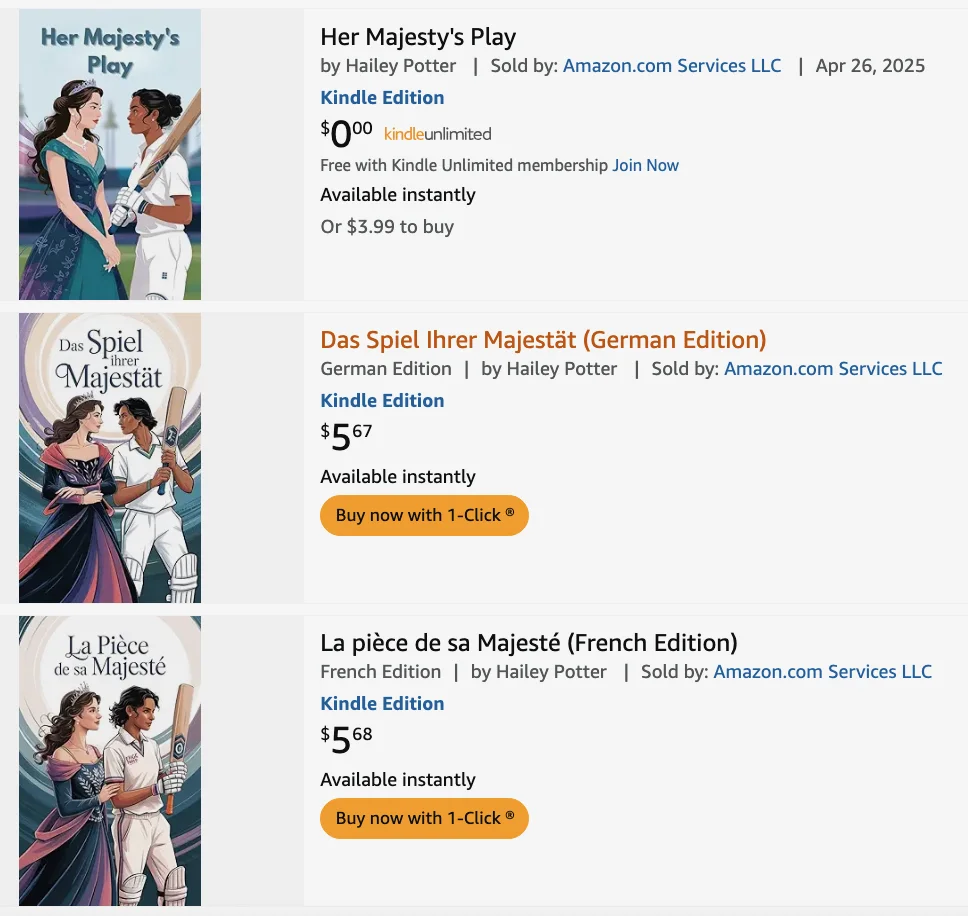
The suspected “authors” who very likely create AI rip-offs
Here’s a list of “author” names I very strongly suspect of creating AI rip-offs. I’ll keep this list updated and add more names to it whenever I find more scammers, so you might want to check back every now and then.
There’s a very clear connection between all of those authors, and I strongly suspect they are all the same person operating by the same pattern.
I have also put together a list of AI rip-offs with titles and author names so you know which books to avoid. The Google sheet shows the status of each book (e.g., has Amazon removed it or is it still up) and whether the original work has been identified.
- Abigail Bennett
- Alisa Blair: Added to the list on May 3
- Ana Bash: Added to the list on May 3
- Charlie Myers
- Denise S. Willard
- Elara Skye
- Elaria Wren: Added to the list on May 15
- Elena Jacob
- Hailey Potter
- Judith Tucker
- Julie Hills
- Juliet Walker
- Kaelen Rook: Added to the list on May 2
- Maya Ramos
- Nicole Carr
- Penny Adu: Added to the list on May 15
- Queen Xavier
- Rachel Riley
- Sage Hardy
- Sandra Benson
- Sophia Cooper
- Valerie Smith
What has been done so far?
Several authors and I have reached out to Amazon, but we haven’t heard back yet.
The first handful of books we discovered are no longer available on Amazon, but we suspect that the culprit took them down because they were garnering too many 1-star reviews, not that Amazon removed them.
We don’t yet know Amazon’s stance on those AI rip-offs. Since those people aren’t copying our stories word-by-word and the AI introduced enough differences to the original, it likely doesn’t count as plagiarism. Ideas aren’t protected by copyright, only the specific way an author wrote that idea is. The law hasn’t caught up with what AI technology can do, so authors likely don’t have much legal protection in these cases.
What can you, as a reader, do to help?
- Spread the word. Share this blog post with fellow readers. The more people are aware of the existence of these rip-offs and how to identify them, the better our chance to stop this.
- Don’t buy or read rip-offs. Learn how to recognize red flags so you’re not supporting those fake “authors” by buying their books or reading them in KU. The goal is to prevent them from making any money. That’s probably the only thing that will discourage them from continuing their scams.
- Keep an eye out for rip-offs: While you’re reading, pay attention to books that sound eerily similar to other sapphic books you have read. Readers are often how authors find out about rip-offs and plagiarism since many of you read may more than the average author, so we rely on eagle-eyed readers to alert us of potential problems.
- Don’t avoid new-to-you authors. We don’t want to create a climate where every author is under suspicion. That could be extremely harmful to authors, especially debut authors who haven’t had a chance yet to establish a relationship with readers.
- Don’t jump to conclusions. It’s important to be extremely careful when making any claims about plagiarism or AI-generated rip-offs. Accusing an author of copying another’s work can have serious consequences for that person’s career and mental health. The last thing we want is to harm any innocent authors. That’s why I included all of these caveats. Please be careful not to go around accusing authors of publishing AI rip-offs or plagiarism because they might fit a couple of the criteria listed above.
- Alert the author. If you discover a book that you suspect might be a rip-off, contact the original author. They might be better equipped to tell whether it’s indeed a rip-off or a just coincidental similarity.
- Report rip-offs once you have confirmation it’s a rip-off. You could report rip-offs to Amazon if you are absolutely, positively certain it’s a rip-off. There’s a “report an issue” link on each book’s Amazon page. But be very careful not to accidentally report the original or a book that just has accidental similarities. My advice would be to report books only once you’ve contacted the author of the original work and they’ve confirmed that the suspicious book you found is a rip-off of their work.
- Review rip-offs once you have confirmation it’s a rip-off. Leave a 1-star review and warn fellow readers that it’s an AI-generated rip-off. You could mention the title and author of the original book to guide fellow readers to the original. Again, only do that once the original author has confirmed it’s a rip-off.
- Help authors whose books have been ripped-off. Some authors will reach out to their readers for help via their newsletter or their Facebook reader groups, letting you know their book has been ripped off. That’s when you can help by leaving a 1-star review or reporting the rip-off as described above. If you are on Facebook or Instagram, check out my “sapphic books so great scammers are copying them” post. It’s an attempt to turn this thing around and put the focus on the authentic authors of the original works that have been ripped off by those scammers.
- Check out the “authors” listed above. Do any of their books sound familiar? There are still plenty of books I haven’t been able to identify. If you are sure you recognize which original book the rip-off is based on, let me know—I can tell you if I already discovered the same book and reached out to the original author or not.
- Support the originals. Support real authors by reading their books and leaving honest reviews.
This situation is heartbreaking and infuriating, not just for the authors whose hard work is being stolen, but for readers who deserve authentic, thoughtfully crafted stories instead of regurgitated AI slop without any soul or sense.
I hope we can all work together to spread awareness, stop this exploitation of our community, and support real authors.
Thanks for reading,
Jae

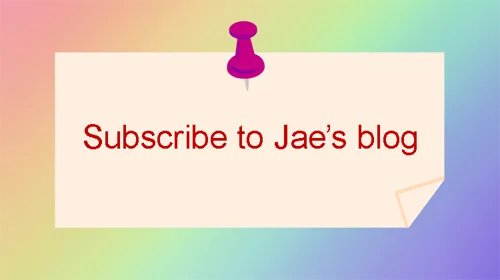
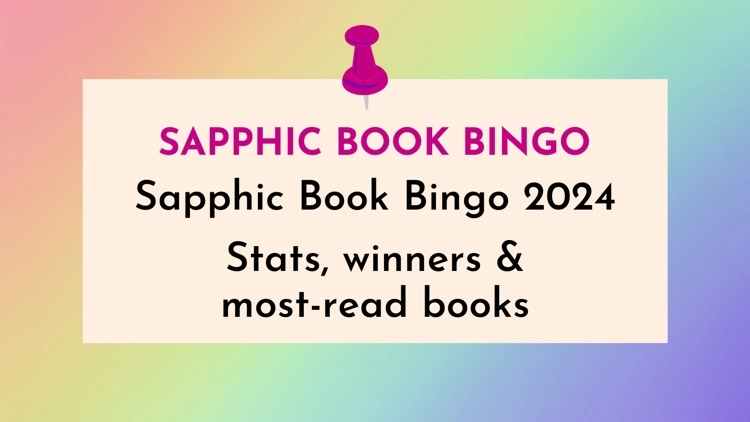

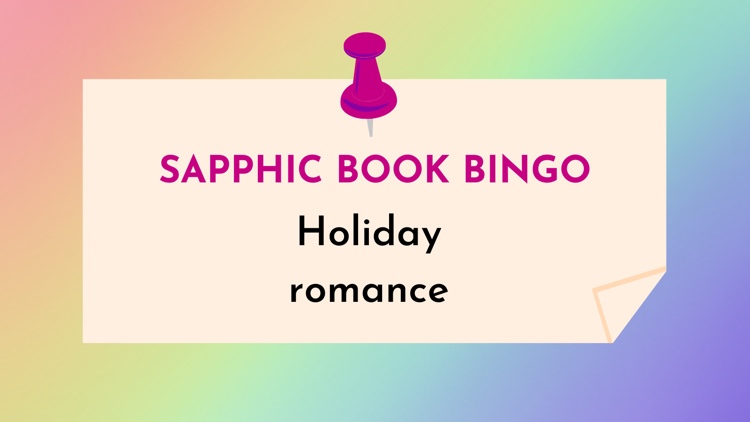
49 Responses
I am blown away by the prevalence of these scammers. Thank you so much for the informative post.
Having a better idea what to look for and how to handle suspected rip-offs is a huge help.
Thanks for the info. I usually only buy from Amazon. I would prefer to buy diirectly from the authors!
Wow! Just Wow! I immediately went through my library and luckily did not find anything from the authors listed. It will take me a while to peruse my to-buy list, but at least I’ve been warned.
I get most of my recommendations from your Bingo, TLR, and I Heart Sapphics lists. I not only trust these for original works, but also for the quality of the books that are recommended.
All this, is a round-about way of saying while I’m sorry this nonsense is happening, I am so appreciative of your determination to root out these vile bastards.
I know I Heart SapphFic and TLR try as hard as I do to keep scammy books off our lists, but we’re always grateful for eagle-eyed readers to alert us should one slip past us.
Geez 😳 I looked up a few of the names listed and, omg, there are soooo many “books”! Different stories and multiple translations in different languages. I shouldn’t be surprised that it’s happening but seeing the amount that are listed under just one name is bonkers. Thanks for doing the work to track that all down, breaking it down and letting people know.
Thank you for this information.
Also, Thank you and all authors , that recommend other authors. That is one of the methods I use to choose new authors.
Thank you for taking your time and getting into this.
Do you have a Tumblr and does this post exist there? If not I will synopsize and link this there to share with all my fellow sapphic romance fans.
I’m not on Tumblr but would be grateful if you could link to the blog post. The more people find out what’s happening, the better. There’s a TL; DR in the post that might be helpful.
Wow!!! Thanks for all the info and for being so diligent in your effort to stop this thievery!
Thank you Jae! I saw the trend on the AI generated audiobooks first. Then I looked up the new e-books coming out, and noticed a bunch of authors with a whole series of books out in the same week! This has to stop. Not only are they harming you guys writing your hearts out, the new comers to the genre don’t know which books are real. I will do what I can , 1-starring, letter writing and making those I know aware of the trend. Take care and keep on stepping.
I’m not a fan of AI-generated books or covers, but I think it’s necessary to point out that not every book with an AI cover is a rip-off. An AI cover is just one of the many red flags that help you identify rip-offs.
Thanks for all your support!
This is terrible and I will definitely share! Good luck fighting this. I will be on the lookout for these fakes. Thank you for letting us now.
Thank you Jae for this post. I came across several ebooks by “Judith Tucker” on Amazon and they were obviously rip-offs. I had so many questions about what I could/should do. After all, I didn’t have proof, and was nervous to make a false accusation. So I did email a couple of the authors that I get newsletters from. Then I did use the “Report an issue” link on the ebook’s page to report it to Amazon. I think a lot of people must have done the same because within a week all the books and the “author” were gone from Amazon. But there are so many more. And not just the rip-offs but the AI-generated books as well. There are many articles online that tell you how to spot these AI created books. Like your post, the tips they give are helpful. It’s important to help and support our community and real authors because OUR voices matter. We should be the ones telling our stories. We can’t let them control the narrative. Can’t let them erase us. Thank you for all you do. Keep writing!
Thanks so much! Judith Tucker was indeed the first scammer pseudonym we found, so your email to authors might have been what started me down this rabbit hole, so thank you!
I hate seeing online bookstores flooded with AI-generated books, but legally, there’s nothing we can do about them. The rip-offs I describe in this blog post are different in that the “authors” didn’t even come up with the plot idea themselves but stole it from real authors and tossed it into AI.
Let’s hope we can find ways to keep our books authentic and to support human creativity!
So wild question…one of my friends appears to have their IRL name in use as one of the AI authors here. She writes under a pen name, but it was still wild to see her name on the list, especially since it could create confusion for people who know both her real name and that she writes under a pen name. Any advice for such a situation?
I would say that has to be a coincidence because how would the scammers know your friend’s real name if she uses a pseudonym for her work? I would be much more worried if the scammers used an author name, which would confuse readers.
My advice would be to help get that scammer’s book down from Amazon. Your friend can take a clear stance against AI rip-offs, without having to reveal her real name. Behind the scenes, she can make it clear to those who know her real name that one of the scammers uses the same name, but it’s not her.
Thank you for this! I always love to try new authors on KU and when a recommended book came up by Elena Jacob, I gave it a shot even though it sounded very familiar to Mistakes Were Made. It was really disheartening as I was reading because as I didn’t want to jump to conclusions, there was no possible way a human could write this (Besides not making sense & clearly plagiarizing poorly, at one point their main character scolds themselves by saying their own last name. However, they used the last name of the character in the original book, not the name they created. Not to mention it was an exact moment from Mistakes Were Made). I didn’t want to be accusatory so I wrote a one star review but it was still bothering me. I appreciate the info of what to look out for and what to do as I notice more books like this popping up on KU.
Just would like to add, as a professional cover designer and illustrator that the statement “Not all AI-generated covers are necessarily rip-offs” is incorrect, as AI generated covers are exactly that: Rip-offs and plagiarism. The technology behind the training of GenAI specifically is trained on stolen artwork and it has already impacted artists worldwide. If we’re going to rightfully callout these “writers” who mass generate their books based on existing stolen work we can, and should, extend the same courtesy towards artists/illustrators and cover designers.
I rephrased the section to make my stance on AI clearer: “…As I stated above, using generative AI to create covers is ethically questionable because AI was trained on the works of artists and cover designers without their permission or compensation. An author using AI for their cover doesn’t necessarily mean they stole the blurb of a specific book to create a rip-off, though. However, an AI cover without any author name or the wrong name is a clear red flag that indicates a rip-off. Not a single legitimate author I know would publish a book with a cover that doesn’t have their name on it. It’s not only unprofessional, it’s also against Amazon’s terms of service, so authors know to avoid that…”
But in this blog post, I’m talking about a specific pattern of a specific scam that I’m helping readers identify. These scammers not only use AI to create the cover and write the book, they also steal a blurb from an individual author. They’re ripping off one specific book, and that last part is something that not all people who use AI covers do. So I do think making that distinction is important.
I’m letting each reader make their own choice whether they want to stay away from authors using AI-generated covers or not. Personally, I steer clear of them because I support artists and cover designers.
Thank you Jae for all that you do to protect authors and readers in our community. So far I have not found any books in my library from the names you listed. It does make it difficult for readers to trust new authors and that is sad. I have gotten into the habit of signing up for the newsletters from all the most popular authors because I trust them when they recommend books from other authors. No one is perfect, of course, but having the pointers you list goes a long way towards spotting the fakes. Thanks again Jae.
If only these people put their talents to writing their own stories, life would be so much better. But alas we live in a world where “scammers “ are thriving.
I am always careful with my book purchases and reviews but now armed with more strategies to identify dodgy ones, thank you for all your support of authors, it much appreciated by the readers as well.
I went to Amazon and left 1 star reviews on every “author” that I could find mentioning that it was most likely a ripoff. I noticed that some were not there, at least on the US Amazon site.
Thank you, Jae.
The greed of some people never ceases to amaze me, because all these people want is money. I know there are so many authors now who self publish so we can’t have Amazon only work with certified publishers, but it sometimes feels like it’s never ending trying to stop plagiarism and stealing from authors. The emergence of AI has just made things considerably easier, I hope readers become a bit warier when reading and purchasing books.
Hi there: I’ve come across another author that doesn’t look legit – Eva Lovelle. Is this a real person? I’m sorry that this happening to so many talented writers!
I checked her out, and she does look suspicious. She’s using AI covers, her author’s bio and photo are AI, and she did use one of the names (Maya) in one of her books. I could not find any of the originals she might have stolen from, though. This is definitely one to keep an eye on!
I wrote a 1 star review and left comments about The Wedding Week Contract being a copy of the wedding date contract, I mean the character names changed 75% through the book to the characters in the other book. Amazon emailed me and said because the couldn’t find that I had purchased it (borrowed on KU) that they were taking my review down. B.S.
Wow. Now they want you to purchase a stolen book, adding money to the pockets of the scammers? BS indeed!
Is the book Melting the Ice Queen by Nicole Carr one of the books you already identified? If not, looks like a rip-off of Taming of a Rebel by Eada Friesian.
Thank you! No, that’s not one I had found the original for. I’ll lead Eada know. Thanks so much!
Lara Taylor seems to be another AI author. More specifically her book “My Off-Limits Grumpy Professor” and Sage Hardy “The Professor I Shouldn’t Want” share similar blurb (e.g. moving back to finish school, professor is their neighbor, 20 yr age gap). Have yet to find the original author.
I checked her out. No doubt she uses AI (even her author’s photo on Amazon is AI-generated), but it’s not another pseudonym of the same scammer.
Thank you so much for the work you put in for the community and spreading the word. Awareness is so important and I’ll keep watching out for scammers.
Thank you!
Es muy indignante esta situación .Y muy meritorio que te ocupes de ella , querida Jae.Trataré de tener en cuenta todas tus suguerencias .El mundo se está convirtiendo en una selva , en la que hay que luchar con uñas y dientes por defender nuestros derechos .Gracias por lo que haces por las autoras y por todas nosotras, las lectoras.
Feliz día , trabajadora !!! Desde Argentina
Thankyou if i come across any i will make it known!
Thank you!
Thank you for your investigative work, Jae. I fear it is only the tip of the iceberg but making sure more readers are aware is the way to fight it.
This is beyond disturbing. Thank you as always, Jae, for the work you do to research and relay scams such as this one. I am keeping that fake-author list handy and am on the look out for red flags!
Thank you Jae for the head’s up and all your research. This stuff is so disturbing. Last thing we need to be dealing with when we’re trying to just write and publish books. On it goes …
Hi, are these “authors” also on goodreads?
Yes, they are. With Amazon & Goodreads being connected, it probably happens automatically, without these “authors” adding their books.
Here’s an example: https://www.goodreads.com/book/show/229128368-kissing-the-ice-queen
Thanks for your amazing work. I’va found a new “author” on amazon, Alisa Blair. No name on the book cover and it’s AI generated. But I can’t figure out the title of the original book. Maybe someone has an idea ?
That is definitely another scammer pseudonym. I added the name to the list and will try to identify her titles.
Are reviews another tipoff? Because there’s one author I’m a bit suspicious of, and other than the book having an uncanny valley vibe and an AI cover, one of the things that gave me a red flag was a new author having 1000+ reviews, all 4 or 5 stars. That seems unlikely.
That doesn’t sound typical for this particular scammer. It doesn’t rule out that something else fishy is going on, though. Feel free to email me and let me know the title and author, and I’ll let you know what I think.
I remember Heather Rose Jones said on a recent podcast episode that she had identified certain series that were likely almost completely written by AI. It’s not the same situation since I don’t think these people were directly ripping off authors, but maybe worth comparing your list with hers in case you can find more patterns.
I think it was this episode: https://lesbianhistoricmotif.podbean.com/e/on-the-shelf-for-may-2025-the-lesbian-historic-motif-podcast-episode-313/
I checked the transcript of the episode but didn’t see a mention of specific author names.